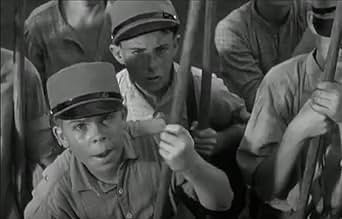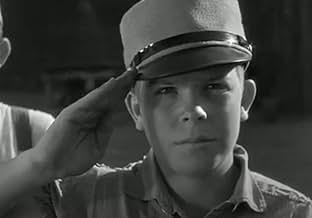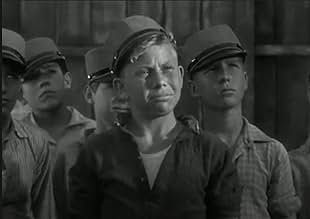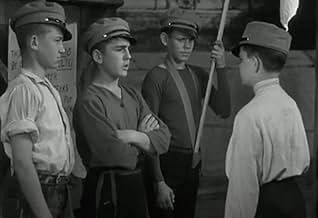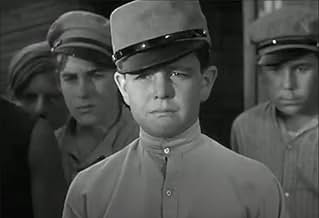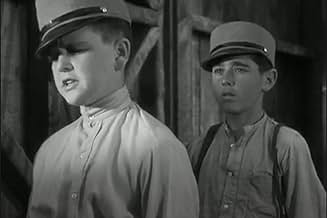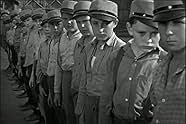AVALIAÇÃO DA IMDb
6,9/10
579
SUA AVALIAÇÃO
Adicionar um enredo no seu idiomaFrail Nemecsek, a lonely boy craving belonging, idolizes charismatic Boka, leader of a gang, in an evocative depiction of youth's pain and war's senselessness.Frail Nemecsek, a lonely boy craving belonging, idolizes charismatic Boka, leader of a gang, in an evocative depiction of youth's pain and war's senselessness.Frail Nemecsek, a lonely boy craving belonging, idolizes charismatic Boka, leader of a gang, in an evocative depiction of youth's pain and war's senselessness.
- Direção
- Roteiristas
- Artistas
- Prêmios
- 3 vitórias e 1 indicação no total
George P. Breakston
- Nemecsek
- (as George Breakston)
Jimmy Butler
- Boka
- (as Jimmie Butler)
Samuel S. Hinds
- Father
- (as Samuel Hinds)
- Direção
- Roteiristas
- Elenco e equipe completos
- Produção, bilheteria e muito mais no IMDbPro
Avaliações em destaque
No musical spots, no romantic sub-plots, not even a girl around! Well, there's the great Lois Wilson as the leading kid's mother, and she's always worth watching, but make no mistake - this is about how boys develop their thinking process, their pecking order, and their views of the world. Not a hint of "boys will be boys," but boy, is it ever obvious in this unusually fearless, serious piece of anti-war propaganda. I would love to see this film restored, revived, and road-show-presented to every school in the country. It doesn't matter a dot that there are no girls in the story, either, as the subject is more valid today, perhaps, in light of world terrorism and how boys are being raised in other lands, than it might have been considered in 1934. We've enjoyed Molnar plays and tales - Liliom, The Good Fairy, The Guardsman, et al, but nothing prepared me for this hard-hitting, no holds barred filming of his book, the Paul Street Boys. There are plenty of marvelous character players, including Christian Rub, Samuel S. Hinds, Ralph Morgan, and of course, Miss Wilson, but it is the younger actors who race away with this picture, particularly everyone's favorite brat, Jackie Searle (who will not disappoint you!), and everyone's favorite tough guy, Frankie Darro, here offering a more layered, thoughtful performance than he is usually allowed to give. Though all the boys are terrific, one stands out, young Georgie Breakston (remember that wonderful moment in IT HAPPENED ONE NIGHT just after everyone sings "The Man on the Flying Trapeze" - the bus hits the mud and everyone goes flying - it was Georgie Breakston who broke the mood with his plaintive "Ma! Ma!" and gets the money from Colbert and Gable!!) effectively carrying the picture on his tiny shoulders. His performance in NO GREATER GLORY makes a lot of more famous child players seem like cardboard cut-outs. Write to your Congressman about this one, but try and find a copy and show it to your children!
Is this an allegory? Is it intended to show the futility of war? Is it just a story of a moment of boys' life? Supposedly it is somewhat autobiographical, a story by Ferenc Molnar.
Whatever its intent, and I suppose a viewer is allowed to see what he wants, it is a moving and beautifully done film.
There is one very sad irony: Jimmy Butler, who gives a magnificent performance, and who shows so much talent you just know he is going to be a big star, was later a casualty of the real war, World War II.
He shows astonishing presence, especially for one so young -- he was 13 when "No Greater Glory" was released -- and gave a performance not surpassed by many adults.
Frankie Darro, sometimes billed as "Darrow," was nearly always simply great (You must see him in "Wild Boys of the Road," where he performs surely the first "break dance" on film.), and he is a stand-out here.
Ralph Morgan and Lois Wilson are wonderful as parents of the boy played by George Breakston, just heartbreaking as they wish their little son recovery from his illness.
Really, even when an occasional player is less than great, this movie and the portrayals are enthralling.
Turner Classic Movies is to be commended for letting us see this.
Whatever its intent, and I suppose a viewer is allowed to see what he wants, it is a moving and beautifully done film.
There is one very sad irony: Jimmy Butler, who gives a magnificent performance, and who shows so much talent you just know he is going to be a big star, was later a casualty of the real war, World War II.
He shows astonishing presence, especially for one so young -- he was 13 when "No Greater Glory" was released -- and gave a performance not surpassed by many adults.
Frankie Darro, sometimes billed as "Darrow," was nearly always simply great (You must see him in "Wild Boys of the Road," where he performs surely the first "break dance" on film.), and he is a stand-out here.
Ralph Morgan and Lois Wilson are wonderful as parents of the boy played by George Breakston, just heartbreaking as they wish their little son recovery from his illness.
Really, even when an occasional player is less than great, this movie and the portrayals are enthralling.
Turner Classic Movies is to be commended for letting us see this.
This forgotten little family / children's film is about bigger adult issues. This sweet film is about acceptance of those who are different. It uses so much symbolism and so many metaphors it seems is seems like the whole cast is on a soap box. But it's worth it. During the heart of the Great Depression with a pending war in Europe these issues needed to be raised by those who would be fighting for them just ten years later. Two rival gangs of school boys are at war over the same vacant lot as the only place left for them to play. The writer and director focus on the world as the boys see it and so the audience is brought inside the walls of the fort and the earnest issues of homeland, friendship, loyalty and tolerance. An almost too sweet story unfolds and we get to know these youngsters and are touched by their views. I recommend this film and thank Cinesation, the annual Silent & Early Film Festival held in Michigan each fall for playing it on the big screen!
In a busy military hospital, one German soldier bemoans participating in a deadly World War, shouting out, "Patriotism is a loathsome lie!" Then, the story dissolves to a Hungarian schoolteacher telling his young students, "There is nothing finer than Patriotism, nothing nobler than War in defense of the country!" Keeping a few of the boys after school, for passing notes, reveals they are part of a gang. They are "The Paul Street Boys", and they are being threatened by older teenage gang "The Red Shirts" who want to take control of a vacant lot. The lot is the only one left in the neighborhood where the gang can meet and play. "The Paul Street Boys" like to play war games.
Most of the two dozen members of the gang are officers. Only small but determined George Breakston (as Erno Nemecsek), remains a "Private". Young blonde Breakston is the smallest because he won't wear heels. He's also clumsy and admits to being afraid - but "Nemecsek" possesses an enviable amount of determination. Despite being made a scapegoat in the group, Breakston admires "The Paul Street Boys" courageous leader Jimmy Butler (as Boka), who is reelected over a scheming Jackie Searl (as Gereb). Young Searl gets only two votes, from himself and the confident winner.
The boys are playing marbles when "The Red Shirts" cocky leader Frankie Darro (as Feri Ats) arrives on screen. Mr. Darro is obviously going to be hard to beat. Darro has already made inroads; working for the enemy, Searl lets Darro sneak into the "Paul Street Boys" lot and steal their flag. That evening, Breakston volunteers for a dangerous mission - to accompany leader Butler and banana lover Donald Haines (as Csonakos) to "The Red Shirts" camp, and bring back their flag. You'll have to see for yourself how successful they are, but you can be sure the gangs go to War...
An interesting side effect of Breakston's capture is the respect Darro has for his enemy's heroics. Breakston would find himself a more valued member of Darro's gang, but never wavers in his support for Butler. These relationships are highly intriguing. You can probably read a lot of different things in the allegorical story (my favorite "reading" is of "Nemecsek" as Jewish, but there are other interpretations). This film is clearly from a superior source, even without the introduction, "From Ferenc Molnar's immortal book." As it turns out, this is a classic novel from Hungry. For upshot Columbia Pictures, director Frank Borzage, photographer Joseph August, and editor Viola Lawrence excel.
Each of the performers are outstanding, with an amazing lead by Breakston. He may tend toward the sentimental, but plays it as directed. The producers and/or Mr. Borzage seem to have added an "All Quiet on the Western Front" type opening, which partially works; really, the story was strong enough as is. Also regrettable is the decision to intentionally speed up the film in selected parts. Incredibly, this received an homage in the opening of the excellent 1969 re-make, which was nominated for an "Academy Award" in the foreign language category.
******** No Greater Glory (3/14/34) Frank Borzage ~ George Breakston, Jimmy Butler, Frankie Darro, Jackie Searl
Most of the two dozen members of the gang are officers. Only small but determined George Breakston (as Erno Nemecsek), remains a "Private". Young blonde Breakston is the smallest because he won't wear heels. He's also clumsy and admits to being afraid - but "Nemecsek" possesses an enviable amount of determination. Despite being made a scapegoat in the group, Breakston admires "The Paul Street Boys" courageous leader Jimmy Butler (as Boka), who is reelected over a scheming Jackie Searl (as Gereb). Young Searl gets only two votes, from himself and the confident winner.
The boys are playing marbles when "The Red Shirts" cocky leader Frankie Darro (as Feri Ats) arrives on screen. Mr. Darro is obviously going to be hard to beat. Darro has already made inroads; working for the enemy, Searl lets Darro sneak into the "Paul Street Boys" lot and steal their flag. That evening, Breakston volunteers for a dangerous mission - to accompany leader Butler and banana lover Donald Haines (as Csonakos) to "The Red Shirts" camp, and bring back their flag. You'll have to see for yourself how successful they are, but you can be sure the gangs go to War...
An interesting side effect of Breakston's capture is the respect Darro has for his enemy's heroics. Breakston would find himself a more valued member of Darro's gang, but never wavers in his support for Butler. These relationships are highly intriguing. You can probably read a lot of different things in the allegorical story (my favorite "reading" is of "Nemecsek" as Jewish, but there are other interpretations). This film is clearly from a superior source, even without the introduction, "From Ferenc Molnar's immortal book." As it turns out, this is a classic novel from Hungry. For upshot Columbia Pictures, director Frank Borzage, photographer Joseph August, and editor Viola Lawrence excel.
Each of the performers are outstanding, with an amazing lead by Breakston. He may tend toward the sentimental, but plays it as directed. The producers and/or Mr. Borzage seem to have added an "All Quiet on the Western Front" type opening, which partially works; really, the story was strong enough as is. Also regrettable is the decision to intentionally speed up the film in selected parts. Incredibly, this received an homage in the opening of the excellent 1969 re-make, which was nominated for an "Academy Award" in the foreign language category.
******** No Greater Glory (3/14/34) Frank Borzage ~ George Breakston, Jimmy Butler, Frankie Darro, Jackie Searl
No Greater Glory (1934)
*** (out of 4)
A rather strange anti-war film that tells the story of two rival kid gangs who are planning to go to war in order to fight over a vacant playground that both sides want. Jimmy Butler plays Boka, a small child who is the only Private in his gang, because he's so small, yet he's the only one will to risk his neck for the greater good of the gang. I've heard people call this a Our Gang Goes to War film and perhaps that isn't too far off base but in the end this is a film I respected a lot more than enjoyed. I'm sure many, many people are going to watch this film and love it but I wouldn't go that far. I think the message is loud and clear but to me it's way too loud and clear. This is the second film I've seen from Borzage's career during this period, the other being Young America, and there's no doubt he wants to get his views across but I think in both films he goes a little overboard. The most impressive thing about this film are the child performances, which range from very good to downright excellent. I was very impressed with the young Butler not only because of his acting but because of his small structure and his ability to rise up and battle. It was a little sad and ironic when I read that he would die in WW2 fighting for his country. George P. Breakston, Jackie Searl and Frankie Darro also add nice work with future Dick Tracy Ralph Morgan having a small role. Another major plus was the cinematography, which looked extremely well and so focused that you couldn't help but feel as if you were there during all the action. The ending, which goes for emotions, certainly gets them and remains one of the most powerful scenes from this era.
*** (out of 4)
A rather strange anti-war film that tells the story of two rival kid gangs who are planning to go to war in order to fight over a vacant playground that both sides want. Jimmy Butler plays Boka, a small child who is the only Private in his gang, because he's so small, yet he's the only one will to risk his neck for the greater good of the gang. I've heard people call this a Our Gang Goes to War film and perhaps that isn't too far off base but in the end this is a film I respected a lot more than enjoyed. I'm sure many, many people are going to watch this film and love it but I wouldn't go that far. I think the message is loud and clear but to me it's way too loud and clear. This is the second film I've seen from Borzage's career during this period, the other being Young America, and there's no doubt he wants to get his views across but I think in both films he goes a little overboard. The most impressive thing about this film are the child performances, which range from very good to downright excellent. I was very impressed with the young Butler not only because of his acting but because of his small structure and his ability to rise up and battle. It was a little sad and ironic when I read that he would die in WW2 fighting for his country. George P. Breakston, Jackie Searl and Frankie Darro also add nice work with future Dick Tracy Ralph Morgan having a small role. Another major plus was the cinematography, which looked extremely well and so focused that you couldn't help but feel as if you were there during all the action. The ending, which goes for emotions, certainly gets them and remains one of the most powerful scenes from this era.
Você sabia?
- CuriosidadesJimmy Butler was killed during World War II on February 18, 1945 in France.
- ConexõesEdited from Sem Novidade no Front (1930)
Principais escolhas
Faça login para avaliar e ver a lista de recomendações personalizadas
- How long is No Greater Glory?Fornecido pela Alexa
Detalhes
- Tempo de duração
- 1 h 14 min(74 min)
- Cor
- Proporção
- 1.37 : 1
Contribua para esta página
Sugerir uma alteração ou adicionar conteúdo ausente

